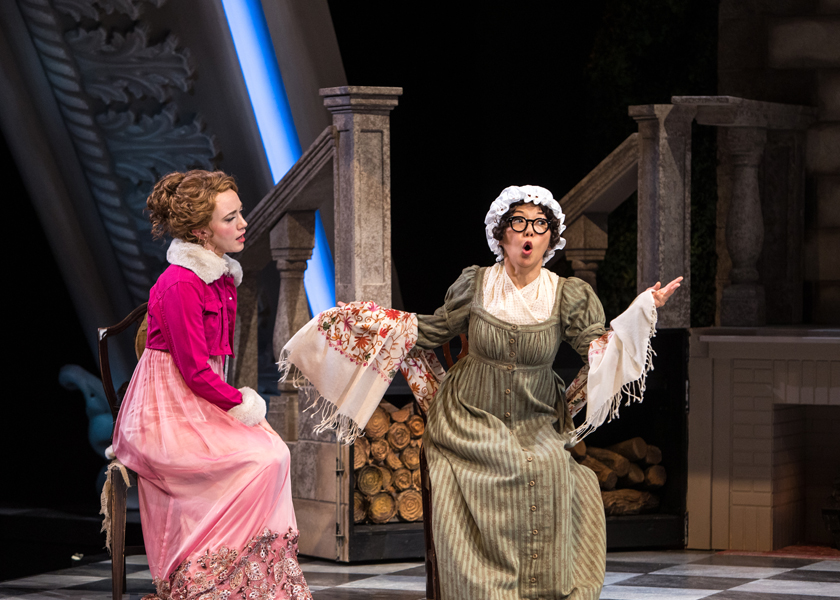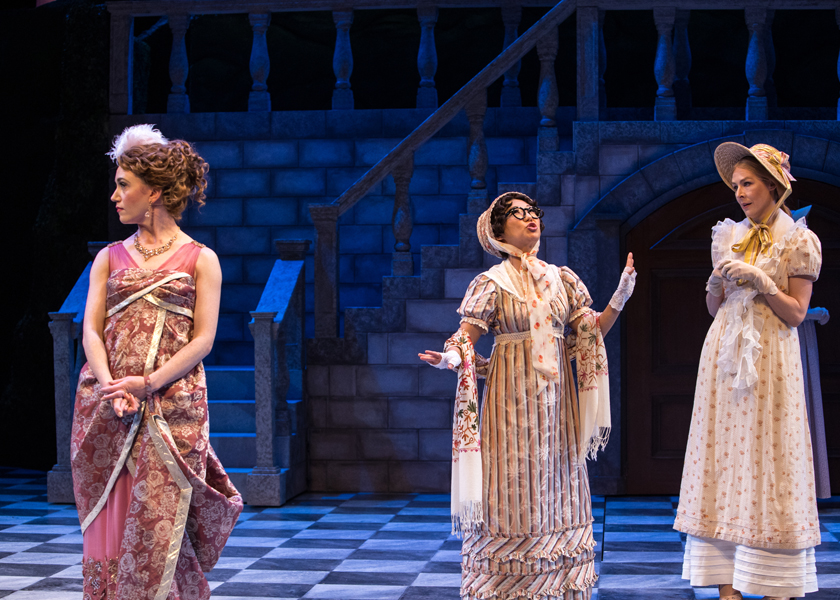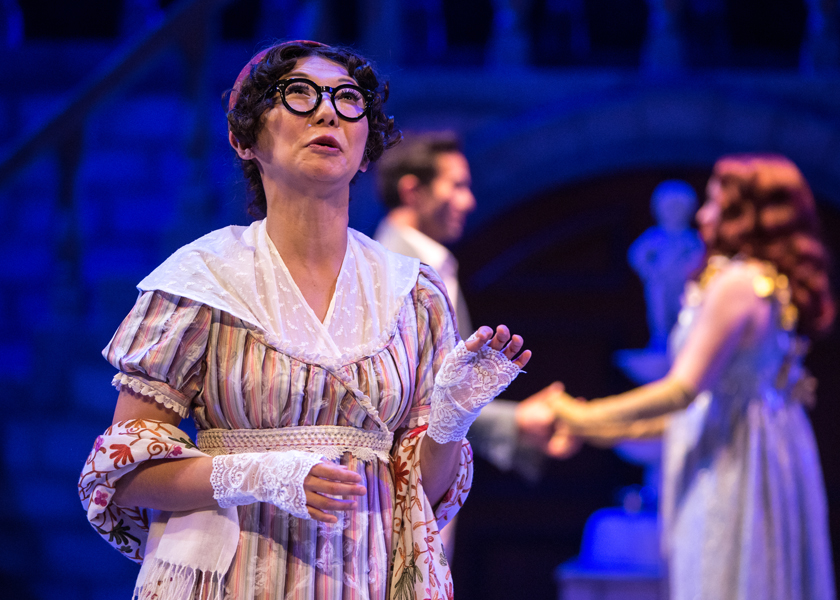A non-traditional take on Austen’s Emma has a comic-modern twist but needs some improved retelling | By Joanne Rhim Lee (Summer 2022)

Emma By Kate Hamill, based on the novel by Jane Austen
(Directed by Meredith McDonough, Guthrie Theater, Minneapolis ~ June 18 – August 21, 2022)
The Guthrie Theater has been waiting a long time to present the world premiere of Emma, Kate Hamill’s adaptation of Jane Austen’s classic novel. Rehearsals began in March 2020, just a few days before the world began to shut down due to the COVID-19 pandemic, and were put on hold for more than two years before starting up again this past spring. Perhaps because of the long delay and the familiarity of the cast and crew, this production is brimming with confidence, joy, and winking inside jokes.

As the title character Emma Woodhouse, Amelia Pedlow is radiant. Emma has had access to the highest levels of education and privilege available to a 20-year-old woman in 19th century England. She has been taught French, chemistry, literature, mathematics, and other topics by her cheerful teacher, Miss Bates, and has been guided in the matters and manners of the world by her proper and wise governess, Mrs. Weston. However, as she does not have an outlet for her intellect and energy, Emma spends a good deal of her time playing matchmaker, celebrating enthusiastically when one of her matches is successful.
Emma believes she is being kind and useful, but it is clear that she sees the world in stark categories. When her new friend Harriet starts a courtship with Mr. Martin, a gardener, Emma frowns on her choice and urges her to set her sights higher, perhaps by attracting the attention of the local rector, Mr. Elton.

Observing all of Emma’s shenanigans is her neighbor, George Knightley, who does not share her amusement, but instead scolds her for meddling unnecessarily in other people’s affairs. As Knightley, Carman Lacivita adds a touching, steady grounding to Emma’s head-in-the-clouds enthusiasm, urging her to come back down to earth and think about the real-world consequences of her actions.
While the first few scenes are fairly faithful to Austen’s novel, as the show moves on, it becomes clear that this is not the same version of Emma that many Austen fans may have read in high school. Playwright Kate Hamill and director Meredith McDonough have updated Austen’s version, injecting humor into almost every scene. There are inside jokes about being cooped up during the pandemic, and at one point, an exasperated character puts on a disposable mask. Instead of dancing traditional waltzes at the various and requisite balls, the characters get down and boogie to Lizzo, Boyz II Men, and Billie Eilish, showing impressive dance skills and choreography.
Though the cast is uniformly excellent, a few actors stand out, in addition to Pedlow and Lacivita. As Harriet Smith, Samantha Steinmetz is both cringingly awkward and touchingly vulnerable, hoping to someday step out of Emma’s regal shadow. Guthrie veteran Sun Mee Chomet imbues what could have been a throwaway character in Miss Bates with both hilarious physical comedy and quiet dignity. As she pushes her elderly mother in her wheelchair while maneuvering for a place at the table or party, she shows that one can have dreams, but also be content in one’s position.
Emma and her friends also seem to be stuck in society’s prescribed roles for them. They seem to want more and be more, but at the same time experience joy in their small stations in life.
Emma is a fun, enjoyable production, especially after such a rough couple of years.
Throughout the show, I reflected on how much times have changed since I first read Emma back in high school during the 1980s. As a teenager, I devoured all of Jane Austen’s novels, as they contained both romance and early elements of feminism. Even though Austen’s female characters had few avenues to follow their ambitions besides finding a suitable husband, they were strong and outspoken, and Austen inferred many important lessons about authenticity, integrity and doing the right thing.
I brought my 22-year-old daughter with me to the play, a recent college graduate with big dreams of her own. As we watched the show together, I saw the story through her eyes this time.
Though the first time I read Austen’s words was more than a century and a half after she had written them, they still felt fresh and relevant to me in the 1980s. Now, in 2022, they seem dated and worn. Of course, women have many more prospects today than they did back then, but even the moral dilemmas that Emma faces seem like obvious non-issues.
As our society and our world continue to evolve, so must our art forms. This production, with its slightly more diverse cast and contemporary music, is certainly a step in the right direction, but perhaps we need to flip or modernize the story and the way it is told to get through to a new generation for whom the idea of an educated women being forced to stay home and play matchmaker is completely foreign.
A recent example is of playwright Lin-Manuel Miranda, who told of the early 18th century life of founding father Alexander Hamilton a fresh, exciting way with his brilliant and groundbreaking Hamilton. He flipped the story with an immigrant perspective of the early days of our nation, utilizing a very diverse cast, and some rap and hip-hop lyrics. Although Emma takes place in the upper echelons of Edwardian English society, Jane Austen does include several interesting characters from the 99 percent. Perhaps, a retelling of Emma could dig deeper and take a page out of Miranda’s book.


